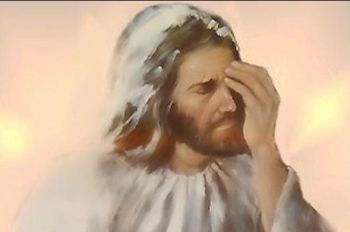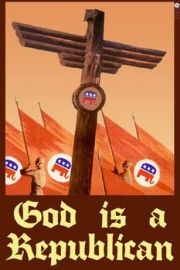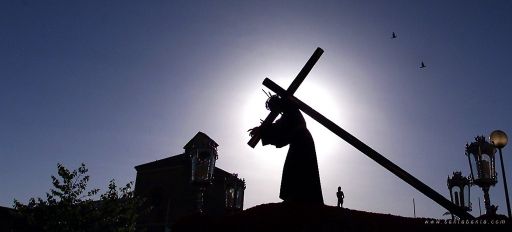
Publisher:
Bonnie King
CONTACT:
Newsroom@Salem-news.com
Advertising:
Adsales@Salem-news.com

~Truth~
~Justice~
~Peace~
TJP
Jan-26-2011 20:22

 TweetFollow @OregonNews
TweetFollow @OregonNews
A Republican Mythology
Kenneth G. Ramey Salem-News.comChristianity evolved as a plan by a coterie of Judaic sectarians convinced its philosophy of One God for All Nations should replace Judaism’s One God of the Jewish Nation.
 Courtesy: Sodahead. Photos of the reported birthplace of Jesus Christ by Dexter Phoenix, from the article: The Day Combat Ops Cleared the Birthplace of Jesus |
(PASO ROBLES, Calif.) - It can hardly be doubted that the Republican Party truly is the Party of God.

The problem is that the Party, its members and Representatives in Congress are misguided in their belief that Jesus is God when there is substantial evidence to prove that he is not the omnipotent and omniscient being they worship in the false belief Jesus guides them and decides what’s best for all.
They error in believing the Constitution is equivalent to the Bible as it relates to politics, and are not wont to refer to one or the other, or both, to justify their position as if that should settle matters when actually it doesn’t.
Both the Bible and the Constitution are constructs of man and therefore subject to interpretation, not submission to their parts.
Isaiah wrote his Book as an Introduction to Christian philosophy and an unnamed “essential man” [presumably Jesus] who agreed to die for the cause in the interest of establishing the Catholic Church.
Isaiah’s Book was written 60 to 100 years before the Gospels, and is as important for what it does not say as for what it does. Consider the following article”
 |
Christianity evolved as a plan by a coterie of Judaic sectarians convinced its philosophy of One God for All Nations should replace Judaism’s One God of the Jewish Nation.
The cult hoped initially to exalt the Jewish God by making him the God of All Nations, a concept unacceptable to Jewish leaders who may have objected to being less than Jehovah's Chosen People. The Cult must have seemed audacious to Jews at best, and impossible in any event; obviously the Jewish leadership miscalculated.
Except for the expansive Religions of the Book; Judaism’s Torah, the New Testament and Islam’s Koran, other communities are beholden to gods of a more parochial invention; symbolic and cerebral concoctions both of which involve emotional and psychological processes that satisfy particular needs within their community.
The Book of Isaiah presumes to be prophecy, but has a manifesto quality about it of principles, policies, and objectives of a Coterie intent on creating a new philosophical entity, the Catholic Church.
Isaiah’s Prophecy places him squarely in the camp of the Coterie. The deity in his Prophecy is the philosophy of the Coterie, and Isaiah expounds at length on the group’s ideology by putting words in the mouth of the “Lord,” the Coterie and its philosophy, and eventually Jesus, chosen to become the Christ and spokesman for its philosophy.
Isaiah refers to the emergence of the Lord [Jesus] in wondrous terms, but elsewhere speaks of his arrival in “little more than a year.” His Prophecy is a mine of nuggets that need to be sifted adroitly from the verbal-rubble if their worth is to be realized. An example is [Isaiah: 49; 1-3] where Jesus is referring to God [the Coterie and its philosophy] followed immediately [49; 4-forward] by the Coterie in a reversal of roles with Jesus as God. In [49; 1-3] Jesus is presented as saying poetically [with additions]:
 |
“The Lord called me from the womb, [the Jewish community]
from the body [politic] of my mother he named my name.
He made my mouth like a sharp sword . . . [he taught me what to say]
In his quiver he hid me away [during the period of my instruction].
And he said to me, “you are my servant, Israel, in whom I will be glorified.”
The Prophecy contains many metaphors of mystery and supposed miracles performed by Jesus that dissolve in light of logic and attention to detail. The significance of the phrase “The Blood of Christ,” for example, is confounding even to many believers, which makes it a worthy subject for explanation.
It is easy to say that Christ died for our sins, but what exactly does that mean? In Christian terms a “sinner” is anyone who exists outside the realm of Christian dogma; that is, sinners have thoughts of their own contrary to what the Church tells us to believe. So, how exactly does Jesus’ sacrifice involve us? The answer to the quandary is detectable if followed from [Isaiah: 49; 1-3-above] that describes the arrival and training of Jesus by the Coterie, to [Isaiah: 53; entire - edited] that refers to Jesus’ crucifixion before the fact, when Isaiah says, with additions, “he poured out his soul to death and was numbered with the transgressors as King of the Jews [metaphorically speaking] and made intercession for transgressors by saying. Forgive them Lord, for they know not what they do.”
 |
Isaiah supposedly is prophesying, but what he describes is so exact one might conclude that the role of the Christ, including how he should die, was conceived in advance. If the why can be known, so too might be the significance of his blood.
Jesus’ calling and his preliminary training was followed by a series of events to assure the Coterie of Jesus’ commitment to his role before he became the Christ. They consisted of several scenarios beginning with his baptism by John the Baptist; next Jesus was returned to the wilderness, the community of his birth, for forty days to test his dedication to the God of his teachers beyond the pull of Judaism. Jesus next was provided with disciples and was sent among the Jews to preach the Gospel and to draw attention to himself, succeeding in causing elders to view him as a rabble rouser, and non-conformist, as the Coterie expected and desired.
Persistent behavior patterns and habitual thinking are the result of ingrained tendencies that make people reluctant to change, especially those who are accustomed to accepting what is “given” them to believe in silence and without question; [Isaiah: 30; 15] says, “in quietness and in trust shall be your strength,” and today’s Evangelists have laid claim to that concept, and insist that those who abide by their preachments are the “true Christians;” and intellectuals are instruments of the Devil [i.e.; sinners].
When Jesus is spoken of aside from Isaiah as saying something, it is likely he did not. For Jesus is referred to in the Gospels sixty to one-hundred years after the fact, as saying what was written generations removed. The Gospels purpose was to add substance to the leaders desire for miracles and mystery regarding Jesus to promote their faith, and later New Testament Books were written by persons to promote Christianity by writing words presumably spoken by God.
When Jesus supposedly asked his disciples, “who do the people say that I am?” none of them were precise but offered a variety of opinions, so Jesus asked, “But who do you say that I am?” and Peter alone identified Jesus as the Christ [Mark: 7; 2-30] in a scripted scenario. For Jesus was named Christ only after he arrived in Jerusalem, not before. Jesus arrived in Jerusalem riding on an ass, according to the Gospels, as humbly he received the accolades of believers who spread palm fronds before him in a celebration that today is referred to as Palm Sunday. Jesus was crucified the Friday following; Good Friday, and supposedly was resurrected, at least in spirit, on Easter Sunday, following the first day of Spring, the start of a new beginning (the planting season); using metaphors suitable to the culture of the time and appropriate to Christian symbolism.
In Jerusalem, the Gospels declare, Jesus’ humanity failed him, when on the Mount of Olives he prayed his cup of death be removed, but an angel of the Lord [the Coterie] reassured Jesus who committed to his obligation to die according to plan, which has since been portrayed in painting and verbally as his Transfiguration from his humanity to a spiritual being, a Gospel rendition not mentioned by Isaiah, as is true of most if not all of what followed his Prophecy decades earlier.
Afterward, in Bethany, while he sat at table, a woman anointed him with oil for burial that earned for him the title of the “Christ” from the Greek; Khristos: christen; to install somebody ceremonially, and give him a new name. Perhaps also on the Mt. of Olives or at Bethany the title of “King of the Jews” was assigned by the Coterie as an essential part of the symbolism intended to bring Christianity to fruition. The next act involved Judas Iscariot and his purported betrayal.
Judas’ name is similar to Judaism, Judaic, and Judaize [to conform to doctrines, observances, or methods of the Jews], and suggests that his name was intended to promote him as a traitor to Christianity, but who seems to have been a member of the cast devoted to its fulfillment. The recent discovery of the Judas Gospel confirms what should have been known from Isaiah when Jesus, during The Last Supper, told Judas to go and do what he must, the object of which seems not to have been in doubt. When Judas was gone, and in apparent anticipation of the expected, Jesus commented to the remaining disciples that his ‘end is near when he will be glorified.’
Jesus, as Christ, awaited the next scene at Gethsemane where he was identified by Judas who kissed his cheek, and a disciple is said to have used a sword to cut off the ear of the slave of the high priest. Isaiah describes the tongue as the "sword of the mouth," an instrument of Christian persuasion, not of steel. Jesus admonished his disciple to put away his sword, was promptly arrested, and soon after was presented before Pilate.
Pilate asked him about the title, “King of the Jews,” and Jesus responded obliquely saying, "My kingdom is not of this world," a line likely given him to recite by the Coterie. Pilate could find no fault with Jesus, washed his hands of responsibility, and turned Jesus over to the Jews for disposition. But the scene makes sense only if the proceedings were orchestrated by the Coterie whose object was that Jesus must die.
If Jesus' Kingdom was not of the Jewish Community, why would he have been branded "King of the Jews," by Jews?" Why, once it was determined he should be crucified, was he crowned with thorns, and by whom? Isaiah's definition of the wilderness was the Jewish community, a wasteland of mental-infertility overgrown with weeds, briars, thorns, and decay. Jesus was committed fully to the Christian cause and his part in it as “King of the Jews.” The crown of thorns, His crucifixion and burial, symbolically represented the death of the Old and the Beginning of a New Order within which, metaphorically speaking, Immortality reigns supreme by the Grace of God, and where outside the Christian Community, Immortal life is impossible. Roman Catholicism expanded by keeping its members ignorant, a tactic Republicans take to heart.
The plot, as in any good play, ends by wrapping up all the loose ends. The Coterie established the Catholic Church, the presumed Resurrected Body of Christ, on the Rock of St. Peter’s Faith using Jesus’ title [Christ] to identify the new religion.
“The Blood of Christ” is resolved in the understanding that it was shed for, and holds the promise of Life-everlasting, to those who partake of the Eucharist which of His Grace is offered to the elect, but is denied reprobates; the damned who refuse to abide by Christian authority.
The Protestant Reformation was successful in the 18th Century when the Counter Reformation of The Roman See, after three centuries of death and destruction by both factions, finally admitted defeat. Today, the American Religious Right,” Evangelical Holy See” of the Republican Party, seeks to push the envelope of its misguided plan to hasten the mythical Second Coming of Christ when Christianity will force its will on all who must either submit or suffer the consequence.
But, Unity through Diversity, with mutual respect for all, will produce better and longer-lasting results than absolute obedience to absolute authority such as the Religious Right and the Evangelical Holy See of the Republican Party seek to achieve.
 Kenneth G. Ramey is a member of Salem-News.com's original team of writers. Ken generates provocative articles on the subject of religion and world affairs. We are pleased that Ken's "lone wolf" presence as a writer in the world has been replaced by a spot on our team of writers at Salem-News.com. Raised in Minnesota and California during the dark years of the Great American Depression, Ken is well suited to talk about the powerful forces in the world that give all of us hope and tragedy and everything in between.
Kenneth G. Ramey is a member of Salem-News.com's original team of writers. Ken generates provocative articles on the subject of religion and world affairs. We are pleased that Ken's "lone wolf" presence as a writer in the world has been replaced by a spot on our team of writers at Salem-News.com. Raised in Minnesota and California during the dark years of the Great American Depression, Ken is well suited to talk about the powerful forces in the world that give all of us hope and tragedy and everything in between.
Ken's work is especially important as we navigate through 2011 which seems like the year of years for real change in the USA and throughout the entire world. Throughout all of this, religion remains a central theme and a critical look at the workings of this sometimes perfect sometimes fatal aspect of life has never been more important. You can write to Ken at: darken1@sbcglobal.net
Articles for January 25, 2011 | Articles for January 26, 2011 | Articles for January 27, 2011

Quick Links
DINING
Willamette UniversityGoudy Commons Cafe
Dine on the Queen
Willamette Queen Sternwheeler
MUST SEE SALEM
Oregon Capitol ToursCapitol History Gateway
Willamette River Ride
Willamette Queen Sternwheeler
Historic Home Tours:
Deepwood Museum
The Bush House
Gaiety Hollow Garden
AUCTIONS - APPRAISALS
Auction Masters & AppraisalsCONSTRUCTION SERVICES
Roofing and ContractingSheridan, Ore.
ONLINE SHOPPING
Special Occasion DressesAdvertise with Salem-News
Contact:AdSales@Salem-News.com



Terms of Service | Privacy Policy
All comments and messages are approved by people and self promotional links or unacceptable comments are denied.
Natalie January 29, 2011 12:23 pm (Pacific time)
Well, aproximately 1/3 to 1/4 of the world population somehow found out about the Resurrection. I guess the news about it didn't quite stay in the village. 'I didn't know therefore it didn't happen' is not a good enough argument. You should've known that, DJ.
Daniel Johnson January 28, 2011 10:07 pm (Pacific time)
It's a no-brainer to refute the idea of Jesus' resurrection. If a man (or someone who had appeared to everyone to be a man) died, (no matter how), and came back to life three days later, it would be world shattering news. If it happened today, it would be Twittered around the globe in a matter of minutes. At that time of slow communication, the news would have spread through the ancient world in a matter of weeks--months at the most. It didn't even spread through the local neighborhood. Ergo--it didn't happen.
Author January 27, 2011 9:33 pm (Pacific time)
John: Isaiah was concurrent with Jesus, but his Prophesy pre-dated the Gospels by 60 -100 years. John, the last of the Gospels relied on the Hermetic Tradition which is dated as being written in the first and second centuries A.D.
john January 27, 2011 1:07 pm (Pacific time)
You're not serious. The Book of Isaiah written 60-100 years BC....Come on. The doubts raised by "scholars" are merely to detract from the prophetic nature of the text. From the naming of Cyrus 150 years before he was King to the detailed description of how Jesus would be would die, Is spells out prophecy and you don't want to believe the text was written in advance. The Psalms too maust have been part of the conspiratory along with the Roman Soldiers who under orders to break Jesus legs did not. I am sure they wanted to make sure the prophecy was fulfilled or were they in on it with the Jews.
atheist vs christian debate January 27, 2011 9:42 am (Pacific time)
Topic: An interesting atheist vs christian debate is available on down-loadable mp3 recording. The debate is from the show "Unbelievable". Their is a debate commentator involved (show host). Humphreys (owner of website jesusneverexisted.com) is active in this organization:http://homepage.ntlworld.com/robert.stovold/Newsletter.pdf An interesting debate between atheist Humphreys and Christian Tony Costa may be heard here: http://media.premier.org.uk/unbelievable/8781856e-7a81-422d-99e9-8d1d7afeecc8.mp3 At 15:07 minutes into the recording the portion begins s regards the debate Ken Humphreys (British, atheist) and Tony Costa (Canadian Christian, particular interest in ‘Resurrection Study’) which unfolds around minute 28:00 At 18 minutes Humphreys begins to explain why he wants to diffuse religion, in that he sees religion as “clear and present danger” and as an academic topic it “intrigues” Humphreys. Humphreys: “there is something fascinating about religious belief, especially when it makes bold claims (such as ‘rising from the dead’).” At 22:00 minutes Costa and his standpoint is introduced and his involvement in religious discourse around the world in various venues. At 25:00 minutes the premise of the show is re-explained by the host, that the topic of the particular show will be debating: “The Resurrection of Jesus” between Costa and Humphreys. The debate begins at 28:25 minutes.
cephas January 26, 2011 11:06 pm (Pacific time)
Read the following website and use the many sources it gives:
[Return to Top]jesusneverexisted.com
©2025 Salem-News.com. All opinions expressed in this article are those of the author and do not necessarily reflect those of Salem-News.com.